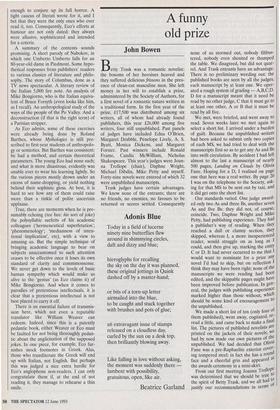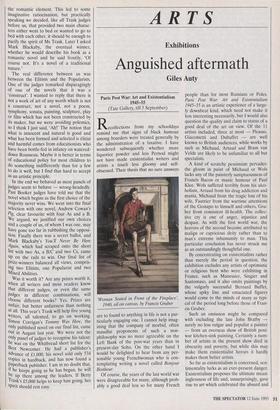A funny old prize
John Bowen
Betty Trask was a romantic novelist: the bosoms of her heroines heaved and they suffered delicious frissons in the pres- ence of clean-cut masculine men. She left money in her will to establish a prize, administered by the Society of Authors, for a first novel of a romantic nature written in a traditional form. In the first year of the prize, £17,500 was distributed among six writers, all of whom had already found publishers, this year £26,000 among five writers, four still unpublished. Past panels of judges have included Edna O'Brien, Margaret Drabble, Penelope Lively, A. S. Byatt, Monica Dickens, and Margaret Forster. Past winners include Ronald Frame, Candia McWilliam, Nicholas Shakespeare. This year's judges were Joan- na Trollope (chair), Daphne Wright, Michael Dibdin, Mike Petty and myself. Forty-nine novels were entered of which 32 were unpublished manuscripts.
Trask judges have certain advantages. We know none of the entrants; there are no friends, no enemies, no favours to be returned or scores settled. Consequently none of us stormed out, nobody filibus- tered, nobody even shouted or thumped the table. We disagreed, but did not quar- rel. And Trask entrants have an advantage. There is no preliminary weeding out: the published books are seen by all the judges, each manuscript by at least one. We oper- ated a rough system of grading — A,B,C,D. D for a manuscript meant that it need be read by no other judge, C that it must go to at least one other, A or B that it must be read by all five.
We met, were briefed, and went away to read. Seven weeks later we met again to select a short list. I arrived under a burden of guilt. Because the unpublished writers had been asked to submit only two copies of each MS, we had tried to deal with the manuscripts first so as to get any As and Bs into swift circulation. By accident I had left almost to the last a manuscript of nearly 500 pages, Landing on Clouds by Olivia Fane. Hoping for a D, I realised on page one that here was a real writer. By page 20 I was on the telephone to the Society, ask- ing for that MS to be sent out by taxi, and it did get onto the short list. Our standards varied. One judge award- ed only two As and three Bs, another seven As and five Bs: they did not, of course, coincide. Two, Daphne Wright and Mike Petty, had publishing experience. They had a publisher's way of reading. When they reached a dull or clumsy section, they skipped, whereas I, a more inexperienced reader, would struggle on as long as I could, and then give up, marking the entry C or D. It had never occurred to me that I would want to nominate for a prize anY novel I'd had to skip, but on reflection I think they may have been right; none of the manuscripts we were reading had been edited, and the skippable pages might have been improved before publication. In gen- eral, the judges with publishing experience marked higher than those without, which should be some kind of encouragement to the unpublished. We made a short list of ten (only four of them published), went away, cogitated,re" read a little, and came back to make a final list. The pictures of published novelists are printed on the jackets of their novels; we had by now made our own pictures of the unpublished. We had decided that Olivia Fane was a pre-Raphaelite exterior cover- ing tempered steel: in fact she has a rouge face and a cheerful grin and appeared at the awards ceremony in a mini-skirt. From our first meeting Joanna Trollope was determined that we should be true to the spirit of Betty Trask, and we all had to, justify our recommendations in terms of the romantic element. This led to some imaginative ratiocination, but practically speaking we decided, like all Trask judges before us, that provided two main charac- ters either went to bed or wanted to go to bed with each other, it should be enough to pacify the spirit of Ms Trask. Later I asked Mark Blackaby, the eventual winner, whether he would describe his book as a romantic novel and he said frostily, 'Of course not. It's a novel of a traditional nature.'
The real difference between us was between the Elitists and the Popularists. One of the judges remarked disparagingly of one of the novels that it was a `construct'. I wanted to reply that there is not a work of art of any worth which is not a construct, not a novel, not a poem, symphony, sonata, painting, sculpture, play or film which has not been constructed by its maker, but we were avoiding polemics, so I think I just said, `Ahr The notion that what is innocent and natural is good and what has been formed and selected is elitist and harmful comes from educationists who have been bottle-fed in infancy on watered- down Rousseau. Maybe it is better in terms of educational policy for most children to do something indifferently than for a few to do it well, but I find that hard to accept as an artistic principle.
In the end we behaved as most panels of Judges seem to behave — wrong-headedly. Past Booker judges have told me that the novel which begins as the first choice of the majority never wins. We went into the final selection with one novel, Andrew Cowan's Pig, clear favourite with four As and a B. We argued, we justified our own choices and a couple of us, of whom I was one, may have gone too far in rubbishing the opposi- tion. Finally there was a secret ballot, and Mark Blackaby's You'll Never Be Here Again, which had scraped onto the short list with two As, a B/C and two Cs, came UP on the rails to win. Our final list of prize-winners balanced all views, compris- ing two Elitists, one Popularist and two Mixed Abilities.
Was it worth it? Are any prizes worth it, when all writers and most readers know that different judges, or even the same Judges in different combinations, will choose different books? Yes. Prizes are unfair, but better unfairness than nothing at all. This year's Trask will help five young writers, all talented, to go on working. Simon Corrigan's Tommy Was Here, the Only published novel on our final list, came out in August last year. We were not the Only panel of judges to recognise his talent: he was on the Whitbread short list for the Best Newcomer. He had a publisher's advance of £1,000, his novel sold only 534 Copies in hardback, and has now found a paperback publisher. I am in no doubt that, if he keeps going as he has begun, he will be up there among the leaders. If Betty Trask's £5,000 helps to keep him going, her spirit should rest easy.



































































 Previous page
Previous page